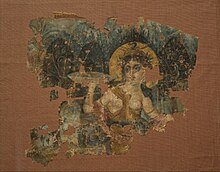Euthenia
Appearance
Euthenia (/juːˈθiːniə/;[1] Greek: Ευσθένεια, Eustheneia) was the ancient Greek female spirit of prosperity. Her opposite was Penia and her sisters entailed Eucleia, Philophrosyne, and Eupheme. Along with her siblings, she was regarded as a member of the younger Charites. According to the Orphic fragments, her parents were Hephaestus and Aglaea.[2]

She is also a part of the Egyptian and Roman pantheon. During Ptolemaic times, she became the consort of Nilus.[3] Her first appearance on Egyptian coins date back to the last decade of BC.[4]
On Roman coins, Euthenia is often compared to Abundantia, the personification of abundance and prosperity, and Annona, the personification of the grain supply to Rome.[5]
References
- ^ "Eu Beauty!". British Baby Names.
- ^ Orphica, Theogonies Fragments[full citation needed]
- ^ "Curtis Chapter I". www.coinsofromanegypt.org. Retrieved 2020-04-07.
- ^ Kákosy, László (1982). "The Nile, Euthenia, and the Nymphs". The Journal of Egyptian Archaeology. 68: 290–298. doi:10.2307/3821647. ISSN 0307-5133. JSTOR 3821647.
- ^ "Euthenia and Demeter - Elagabalus". sites.google.com. Retrieved 2020-04-07.
